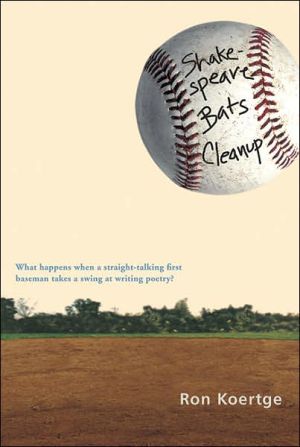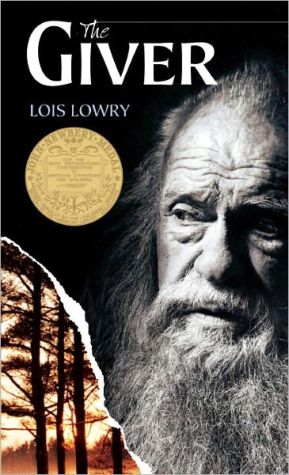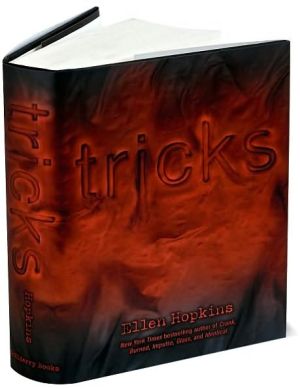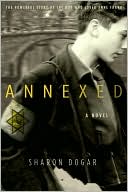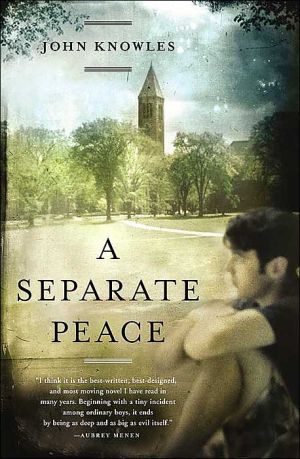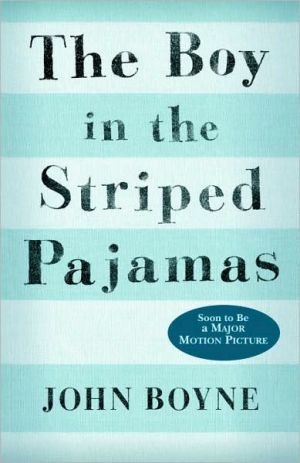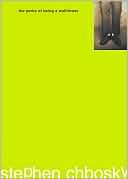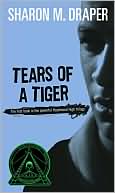Shakespeare Bats Cleanup
"This funny and poignant novel celebrates the power of writing to help young people make sense of their lives and unlock and confront their problems." - SCHOOL LIBRARY JOURNAL (starred review)\ When MVP Kevin Boland gets the news that he has mono and won't be seeing a baseball field for a while, he suddenly finds himself scrawling a poem down the middle of a page in his journal. To get some help, he cops a poetry book from his dad's den - and before Kevin knows it, he's writing in verse about...
Search in google:
"This funny and poignant novel celebrates the power of writing to help young people make sense of their lives and unlock and confront their problems." - SCHOOL LIBRARY JOURNAL (starred review)When MVP Kevin Boland gets the news that he has mono and won't be seeing a baseball field for a while, he suddenly finds himself scrawling a poem down the middle of a page in his journal. To get some help, he cops a poetry book from his dad's den - and before Kevin knows it, he's writing in verse about stuff like, Will his jock friends give up on him? What's the deal with girlfriends? Surprisingly enough, after his health improves, he keeps on writing, about the smart-talking Latina girl who thinks poets are cool, and even about his mother, whose death is a still-tender loss. Written in free verse with examples of several poetic forms slipped into the mix, including a sonnet, haiku, pastoral, and even a pantoum, this funny, poignant story by a master of dialogue is an English teacher's dream - sure to hook poetry lovers, baseball fanatics, mono recoverers, and everyone in between.Publishers Weekly"A 14-year-old baseball star temporarily sidelined by a case of mono narrates this affecting novel told in verse, which scores points for both style and substance," PW said. Ages 12-up. (Mar.) Copyright 2006 Reed Business Information.
Their pitcher walks our leadoff man. Greg moves him up to second with a perfect sacrifice. Fabian loops one into right.\ I'm up. Two on, one out. I'm the cleanup man. My job is to bring these guys home.\ I take a pitch. Foul one off. Take a strike.\ Their left fielder drifts in.\ Bam! I lift one right over his head. A double!\ Two runs score. I slide into second. Safe!\ That's what I'm thinking, anyway, propped up in bed with some dumb book.\ Than Dad comes in and says, "The doctor called. Your tests came back. You've got mono."\ "So I can't play ball."\ He pats my knee. "You can't even go to school, Kevin. You need to take it real easy."\ He hands me a journal, one of those marbly black-and-white ones he likes.\ "You're gonna have a lot of time on your hands. Maybe you'll feel like writing something down."\ IN BED\ Being sick is like taking a trip, isn't it?\ Going to another country, sort of.\ A country nobody wants to visit.\ A country named Fevertown.\ Or Virusburg. Or Germ Corners.\ The border guards are glum-looking,\ with runny noses and pasty skin. Their uniforms don't fit and flap open in the back so you can see their big, ugly butts.\ Nobody wants to go there, but everybody does, sooner or later.\ And some stay.\ PRESSURE\ Dad's never talked to me about writing before. He's not nuts to have me be just like him.\ Len Boggs has a dad like that. It's been Boggs & Son ever since Lennie was about two seconds old.\ They're plumbers. "Got clogs? Call Boggs!"\ Don't laugh. Their vans are all over the place. They're rich.\ And Len hates it.\ Lennie's fourteen, like me. He doesn't know what he wants to do when he grows up. Maybe go in the Marines. Maybe play the cello.\ But he for sure doesn't want to be a plumber.\ His dad is already on his case, riding him about it.\ I think mine's just trying to be nice.\ HOME ALONE\ Well, not exactly. Dad's here, that's why we don't have to get somebody to come in and take care of me.\ First of all, I don't need much care. I sleep all the time, or at least it feels that way.\ Dad works at home. He and I pass each other in the hall—\ I in my sweats, he in his cap.\ When I was little and I got sick, Mom used to read to me.\ Thinking about that's not going to help.\ INQUIRING MINDS WANT TO KNOW\ Why am I writing down the middle of the page?\ It kind of looks like poetry, but no way is it poetry. It's just stuff.\ So I tiptoe into the den and cop this book of Dad's.\ It feels weird smuggling something about poetry up to my room like it's the new PENTHOUSE.\ But I don't want Dad to know what I'm doing yet. Even though I'm not doing anything. Not really.\ I'm just going to fool around a little,\ see what's what poetry-wise.\ HOW DO YOU DO, HAIKU\ I thought I'd start small. I kind of remember haiku from school last year.\ I at least remember they're little.\ But, man—I never saw so many frogs in the moonlight. And leaves. Leaves all over the place.\ Weren't there any gardeners in ancient Japan? Weren't there any cats and dogs?\ Still, haiku look easy. Sort of. Five syllables in the first line, seven in the second, five in the third.\ Frogs, frogs, frogs, frogs, frogs.\ Frogs, frogs, frogs, frogs, frogs, frogs, frogs.\ Frogs, frogs, frogs, frogs, leaves.\ Very funny, Kevin.\ At least I finished it. I can't finish anything else, except my nap. Seventeen syllables is just about right for somebody with my reduced stamina. Perfect thing for an invalid.\ Oh, man—look at that: IN VALID. I never saw that before.\ Just a single space in a word I thought I knew made the difference.\ __________\ SHAKESPEARE BATS CLEANUP by Ron Koertge. Copyright (c) 2006 by Ron Koertge. Published by Candlewick Press, Inc., Cambridge, MA.
\ Publishers Weekly"A 14-year-old baseball star temporarily sidelined by a case of mono narrates this affecting novel told in verse, which scores points for both style and substance," PW said. Ages 12-up. (Mar.) Copyright 2006 Reed Business Information.\ \ \ \ \ Children's LiteratureWhile recuperating from mono (infectious mononucleosis), Kevin Boland keeps a journal in which he writes free verse. Although he describes what he first writes as just stuff down the center of the page, later he tries haiku, sonnets, and other poetic forms. His journal provides a catharsis as he adjusts to his mother's death, his illness, not being able to play baseball, and awareness of finely-tuned teen hormones. He continues to write as he recovers and concludes poetry is "very cool," in fact, "Almost as cool as baseball." With help from lines like those in which Kevin compares poetry to chocolate milk, this book would be a great read-aloud for an English teacher seeking a devious way to introduce poetry. Skim milk is nourishing, he writes, "but chocolate milk is just better." Short and punchy, the book's size alone (116 pages with much white space) guarantees popularity as motivating fodder for book reports. 2003, Candlewick Press, \ — Mary Bowman-Kruhm\ \ \ KLIATTIn the back cover information on the author, Koertge says that he loves baseball and poetry—and that he was at a game once, writing a poem, when he saw a boy whose father was lecturing him on the finer points of baseball while the boy was scribbling on a piece of paper—this gave him the idea for Shakespeare Bats Cleanup. Amazingly, this book is a poetry novel about a 14-year-old boy who loves baseball. It is actually a series of poems, each with a title, but the poems link together to tell a longer narrative. For our purposes, we will say this is YA fiction and review it here. Kevin is the narrator, the baseball player, the writer of poems. The latter surprises even him, but what happens is that he can't play baseball because he has mono and he starts reading a book on poetry his father has lying around. A combination of delight in words and poetry forms has him experimenting with haiku, sonnets, free verse, the ballad, and other styles first as entertainment and then slowly to express his innermost feelings. And he has a lot of these feelings because his mother died recently and he is still grieving for her. He and his father are close, but can't really talk about what they are feeling, so poetry becomes an essential outlet of expression. The story isn't all seriousness, however, because Kevin frequently turns to humor and fun as relief and because he essentially is a typical 14-year-old who wants to have a girlfriend, and who wants to be a star baseball player. So we have such poetry here as: "But Baseball and Sex?" "Guys are always asking, "Did you get/ to first base with her?"/ So boys are the players and girls are,/what, the diamond?".... Teachers facing middle-school boys whowouldn't be caught dead reading poetry might find Koertge a life-saving ally in convincing boys that poetry can be full of life (lives like theirs) and accessible. KLIATT Codes: J—Recommended for junior high school students. 2003, Candlewick, 116p., \ — Claire Rosser\ \ \ \ \ VOYAThis short, atypical novel is narrated by fourteen-year-old Kevin, a former rising star on his middle school baseball team. He finds his life turned upside down after being diagnosed with mononucleosis, spending his recuperative months in isolation creating a journal. Readers discover through his journal pages that Kevin's father is a writer and that his mother has recently died of cancer. One day, he removes a book of verse from the den and begins to explore the construction and variations of poetry. He finds that with practice he can adapt his journal entries to these newfound poetic forms to better express himself. Kevin's page-long entries express his thoughts about baseball and girls in haiku, couplets, sonnets, and ballads. The book is most interesting when Kevin discovers an unlikely girlfriend, who challenges him to embrace his gift for writing, rather than be ashamed of it. Their relationship is poignant and authentic. The novel's idea is clever and allows Kevin to make many deft, sensitive observations about life and relationships, some of which seem beyond his years. He becomes too quickly literate and accomplished at the poetic styles, skillfully melding his life events into clever similes and reveries. Readers who enjoy novels in diary or letter format will appreciate this well-written offering, as will teachers looking for a practical way to introduce their students to poetic structure. The author received acclaim for previous young adult works including The Brimstone Journals (Candlewick, 2001/VOYA August 2001) and Stoner and Spaz (2002/VOYA April 2002). VOYA CODES: 4Q 3P M J (Better than most, marred only by occasional lapses; Will appeal with pushing; Middle School,defined as grades 6 to 8; Junior High, defined as grades 7 to 9). 2003, Candlewick, 128p, Beach\ \ \ \ \ School Library JournalGr 6-9-Like his earlier The Brimstone Journals (Candlewick, 2001), Koertge writes this novel in highly accessible free verse. Fourteen-year-old Kevin Boland is an MVP first baseman whose whole life revolves around baseball. Diagnosed with mono, he is forced to stay at home for months while he recuperates. Bored, Kevin borrows his father's book of poetry and starts writing his own. At first, he just has fun imitating haiku and sonnets, but he soon begins writing insightful verse, both funny and serious, in which he records his candid observations about life in junior high, romance, his dreams of baseball stardom, and his grief over the recent death of his mother. This funny and poignant novel celebrates the power of writing to help young people make sense of their lives and unlock and confront their problems. The cover will lead readers to believe that this is about baseball, but they will quickly realize there is much, much more to this finely crafted story.-Edward Sullivan, White Pine School, TN Copyright 2003 Reed Business Information.\ \ \ \ \ Kirkus ReviewsKoertge (Brimstone Journals, 2001, etc.) joins the ever-swelling ranks of writers experimenting with novels-in-verse with this journal of a teenaged jock who develops a taste for writing poetry while laid up with mono. Confined to the house, and mostly to bed, Kevin starts sneaking peeks into a prosody manual of his father's, and trying his hand at different poetic forms, from haiku ("Frogs, frogs, frogs, frogs, frogs / Frogs, frogs, frogs, frogs, frogs, frogs, frogs, / Frogs, frogs, frogs, frogs, leaves"), sonnet, and pantoum (look it up), to ballad, sestina, blank and free verse. He discovers along the way that he likes the way poetry focuses language, and also makes it easier to express feelings-particularly about the loss of his mother. Reflectively tracking his slow recovery, Kevin also chronicles his struggle to regain a place in his baseball team's starting lineup, and a developing relationship with Mira, a new friend who doesn't laugh off his literary efforts. In the end, although his life is reshaped by his long illness, the future (except on the playing field) still looks bright. Kevin's mix of lame and not-so-lame poems effectively convey realistic learning and recovery curves-and may also plant the idea in receptive readers that it's okay for guys to write. (Fiction. 10-12)\ \
